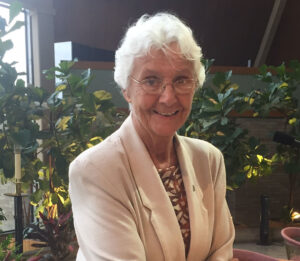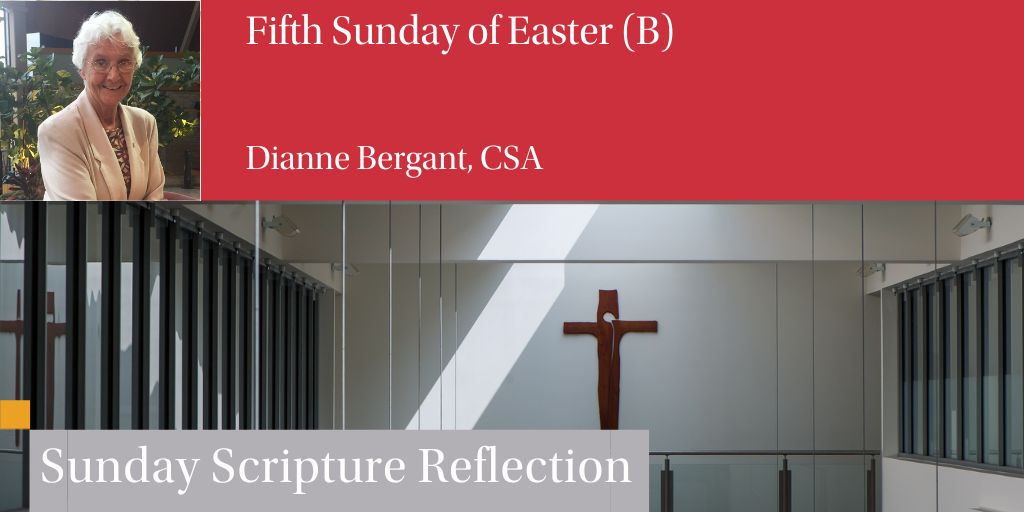
Readings:
Reading I: Acts 9:26-31
Psalm: Ps 22:26-27, 28, 30, 31-32
Reading II: 1 Jn 3:18-24
Gospel: Jn 15:1-8
In the Assembly of the People
The tragedy of Philip Nolan, the major character in the novel The Man Without a Country, was not merely that he was forbidden ever again to set foot on US soil or even hear spoken the name of his country of origin. His fate, chosen by the man himself in a moment of anger, meant that he did not belong to a nation of people anymore. He was literally a man without a community. At first he might have been satisfied with his impulsive decision. But soon he came to realize what we eventually all realize, namely, that as independent as we like to think we are, as human beings we desperately need to belong. Today’s readings form a kind of triptych, a three-part illustration depicting what it means to belong to a post-resurrection community.
The first panel (the reading from Acts) is quite realistic in its presentation. It shows Paul, shortly after his conversion, arriving in Jerusalem with Barnabas. While Paul may have been eager to join the group of disciples, they were understandably suspicious of him. After all, not too long ago he had diligently searched for them in order to hand them over to the Jewish authorities intent on stamping out this new religious movement. On the word of Barnabas, the Christians accepted him into their number and eventually even protected him when his life was in jeopardy.
This is a remarkable community. They not only forgave their former persecutor, but they actually embraced him as a new member. How many communities today exercise such a sense of reconciliation? How many communities open their hearts and their doors to people whose sins have become public? Jesus did not hold Paul’s sin against him and so, following this example, neither did his followers. This accepting attitude is evidence of the presence of the Risen Lord in the post-resurrection community.
The exhortation found in the second panel (the Letter of John) alerts us to the twofold bond that unites all members of this community. We are told to “believe in the name of God’s Son, Jesus Christ, and to love one another.” This love of others is not based on personal preference any more than the acceptance of Paul was based on it. Rather, everything is based on faith in the Risen Lord. We first believe in the Risen Lord, and then this faith manifests itself in love of others.
The love to which John calls us is neither easy nor romantic. It is not love merely “in word or speech but in deed and truth.” It manifests itself in ways that might call for a kind of heroism. This heroism might include accepting back those who earlier had turned away; or it could require that we be open to those who live their lives in ways that we consider unorthodox; or perhaps it calls us to welcome the stranger or those who are in any way threatened. Such love, which is inspired by the Spirit, is evidence of the presence of the Risen Lord in the post-resurrection community.
Jesus’ declaration to his disciples (John’s Gospel) constitutes the center panel, and is really the focal point of the triptych. While the first two panels emphasize the bond that unites members of the community with each other, this centerpiece highlights the union of the members with Jesus himself. The metaphor of vine and branches, a metaphor that under the circumstances is quite bold, vividly characterizes the intimate nature of the relationship existing between Jesus and his followers. A vine is made up of its branches, and the life of the vine is the life of the branches. Jesus lives in his branches, and his branches live in his life. The vine bears fruit through its branches, and the branches bear the fruit of the vine. As important as the branches are, the vine is not totally dependent on any one branch or group of branches. However, there is no vine if there are no branches at all. In such a case, there is only a trunk, and that is not the metaphor that Jesus uses here.
In the face of possible pruning, Jesus declares: “Remain in me, as I remain in you.” Don’t separate yourself from me; don’t try to make it on your own; don’t renounce your membership in me. You are not without a country; you are not without a community; you are not without a source of life. We are branches of the true vine, joined to the vine and through the vine to each other. If the life of Jesus flows through our ‘veins,’ we will “bear much fruit.” We will indeed shine forth in our world as a community called together and enlivened by the power of the resurrection. We will be a reconciling community, open to others and able to show the world that reconciliation with enemies is possible. We will be a community bound to each other by love and able to bring genuine love to a world eaten away by hatred. We ourselves will be the evidence of the presence of the Risen Lord in the post-resurrection community.
Dianne Bergant, CSA
